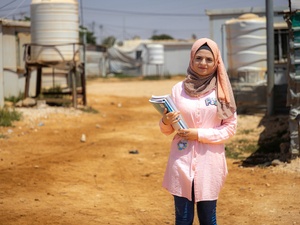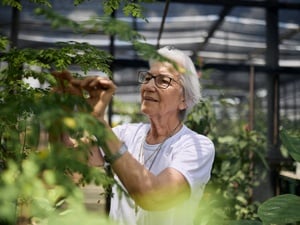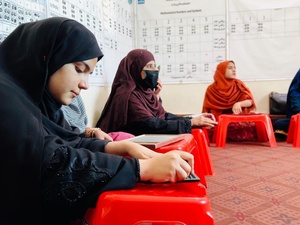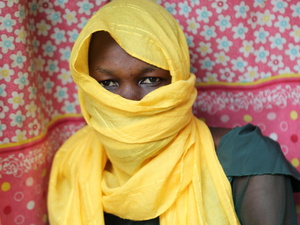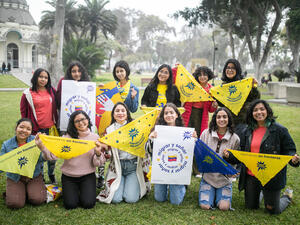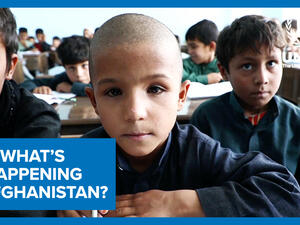Refugee leaders in tune with displaced women's needs
Refugee leaders in tune with displaced women's needs

Refugee leader and singer Mbela Nzuzi (centre) rehearsing in Romania for a Christmas concert.
GENEVA (UNHCR) - Five years ago, Congolese refugee Mbela Nzuzi would never have thought of herself as a leader. Today, she is not only a refugee leader in Bucharest, Romania, but also the lead singer in an African band there.
"I used to be a simple African woman," said Nzuzi. "I thought what was best is to have a household, a child, a husband to bring me income and take care of the family. School, university, work - [these were] much too complicated!"
In 1997, the 26-year-old fled the turmoil in the Democratic Republic of the Congo and arrived in Romania, which hosts some 2,000 refugees. "In this country I have learnt that I, too, can be a modern woman, that I have a lot to offer other people," she said. She is now President of the Refugee Women's Organisation (RWO) in Bucharest.
Her work has not gone unrecognised. On June 17, Nzuzi received a certificate of appreciation from the United Nations High Commissioner for Refugees, Ruud Lubbers, for her efforts to improve the situation of refugee women in Romania. In tune with this year's World Refugee Day theme of refugee women, she sang at the presentation ceremony in Geneva to celebrate the resilience of her peers all over the world.
In Romania, Nzuzi has helped to integrate refugee women into society, encouraging them to participate in community activities and organising cultural events where they interact with Romanian women. "This has been a means of presenting the refugee women to the Romanian society," she explained.
She added that many refugee women have skills but cannot speak English, which prevents them from working and improving their situation and that of their families. So this year, Nzuzi and her colleagues started English-language classes for them. The Kinshasa-born refugee herself speaks English, French and Romanian and uses her trilingual abilities as proof to other refugee women that they too can pick up another language.
Besides Nzuzi, Ruud Lubbers also gave awards to four nominees for their work with refugee women and girls around the world.
One of them was Julia Kharshvili, a refugee who fled the conflict in Abkhazia for Tbilisi, Georgia in 1993. Kharshvili, who now heads the displaced women's organisation in Georgia, realised that because women take great risks to protect their children, their own protection cannot be achieved if their children are unsafe and unable to attend school.
"As one of the main priorities for IDP [internally displaced people] women is an improvement of life conditions, security and education for their children, we tried to focus also on children's problems," wrote the 47-year-old physicist.
"One of the most famous of our programmes became the peace camps, in which children and teenagers from conflict zones - first only from Georgia, and later also from Armenia and Azerbaijan - can meet, live and learn together."
Since the programme's inception in 1996, several hundred children have participated in the camps offering training and recreational activities. Kharshvili's organisation also provides vocational training, civic and human rights education for displaced women in Georgia, which has more than 270,000 displaced people.
Another award recipient was Turkish women's rights advocate Ferda Cilalioglu, who has worked to establish safe houses for abused women in the Turkish city of Van. The safe house provides sanctuary to women from Iran, Iraq and Afghanistan fleeing domestic abuse, trafficking and other forms of violence.
Also receiving kudos was Maria Olandina Alves-Caieiro, who founded East Timorese Women Against Violence (ETWAVE), a non-governmental organisation that aims to build women's skills and fight domestic violence in the newly-independent state of East Timor.
Interestingly, the Men's Association for Gender Equality (MAGE) was also honoured by UNHCR for rallying refugee men around programmes to combat gender-based violence against women living in refugee camps in south-eastern Guinea.
Founder Alfred Dunbar, a former refugee who recently returned to Sierra Leone from Guinea, started the programme in refugee camps in Kissidougou to promote gender equality and increase the number of women in leadership and management committees throughout the camps. Together with Fode Baba Conde, a Guinean working for UNHCR, he has helped refugee communities in the Kissidougou camps to listen more to women and to involve them in food distribution.
Dunbar is now working with a non-governmental organisation in Freetown to raise awareness about human rights and prevent violence against women, many of them returnees, like him, from neighbouring Guinea and Liberia.
Nominating Baba Conde for the award, the UNHCR office in Guinea wrote, "Baba Conde has been a model - His efforts, commitment and dedication have not only influenced change in attitude but also contributed enormously to programmes that support women. He has demonstrated high quality commitment in his keen follow-up of the High Commissioner's objectives for 2002."
At the beginning of the year, High Commissioner Lubbers made commitments to ensure better protection of refugee women. Among these was a pledge to ensure that more refugee women are involved in decision-making, particularly on issues affecting their lives and that of their families.
The refugee agency chief aims to ensure 50 per cent representation of refugee women in positions of leadership, to involve refugee women in food distribution to reduce chances of abuse and exploitation, and to improve registration so that individual refugee men and women would have their own identity document.
By Millicent Mutuli
UNHCR Geneva


